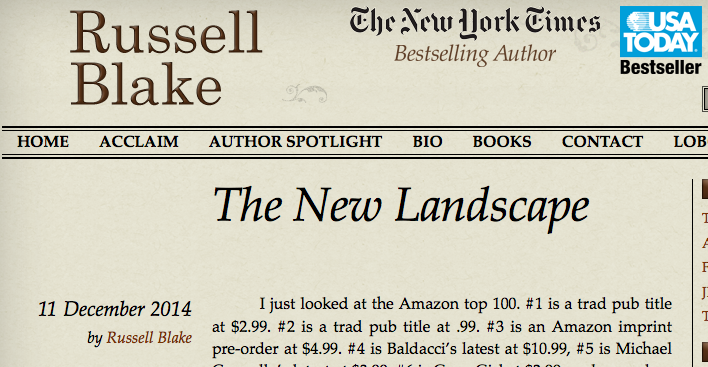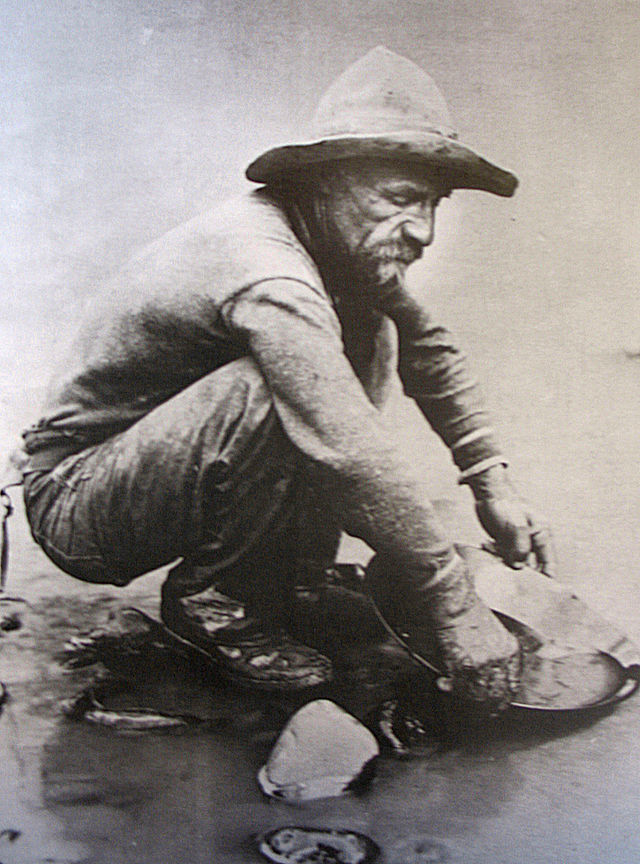 With all the uproar about Kindle Unlimited (SPR included), there is one other major deciding factor that may be driving the self-published sales downturn. Publishers have finally gotten wise to lower prices, thereby eliminating a major tool used by indie writers. Russell Blake writes in The New Landscape:
With all the uproar about Kindle Unlimited (SPR included), there is one other major deciding factor that may be driving the self-published sales downturn. Publishers have finally gotten wise to lower prices, thereby eliminating a major tool used by indie writers. Russell Blake writes in The New Landscape:
I just looked at the Amazon top 100. #1 is a trad pub title at $2.99. #2 is a trad pub title at .99. #3 is an Amazon imprint pre-order at $4.99. #4 is Baldacci’s latest at $10.99, #5 is Michael Connolly’s latest at $3.99, #6 is Gone Girl at $2.99, and on and on and on.
For those indie authors who have seen a marked downturn in sales since KU came in, I believe that’s only part of the story. The other is that since Amazon got lower prices from trad publishers, the price of trad pubbed books is through the floor. Sure, some of that’s holiday discounting, but not close to all.
Which means that the tried and true gambit most indies have been using, which is selling based on price, at .99 or $2.99 or $3.99 or $4.99, likely won’t work particularly well anymore. Because when you can buy Gone Girl for $2.99 and Connolly’s latest at $3.99, why would most readers buy your book at or around the same price?
During the Amazon-Hachette dispute, there was a bit of back and forth wondering why self-publishers were so concerned with traditional publisher’s terms, given that if traditional publishers really did lower their prices, it would screw with the self-publishing ecoystem. David Gaughran wrote in Building a Better Industry (emphasis added):
If we wanted to destroy publishers (or cackle as they destroyed themselves), why would we write posts suggesting that they drop DRM, embrace low pricing, and hurl themselves with lustful abandon into the digital future?
Mike Shatzkin is right when he says that it’s not in our narrow self-interest to do so. But I think there are several flaws with thinking in that very narrow sense. Nate Hoffelder at The Digital Reader nails it:
I am tired of Mike’s assumption that anyone who bashes the publishing industry wants Amazon to win […] some actually are socially aware, and are joining in the debate so they can point out what they see as the best way forward for the publishing industry.
Perhaps, but it’s not entirely fun being on the other side of that equation. On the plus side, it will force self-publishers to be more professional in order to compete with major label books. In the Kindle gold rush days (RIP), it was possible to put up anything (within reason) and have the potential to become a top seller. Books with poor editing and poor covers were doing just fine. But if you could choose between an unedited $2.99 book and a polished one, which one are you going to choose? Over time, poorly constructed books are going to end in the new slush pile: books that aren’t bought. Joanna Penn on Facebook added this comment:
I’m pleased that there’s more competition – it will weed out the Kindle gold rush types.
In an earlier post, Who’s Afraid of Very Cheap Books?, Gaughran wrote:
“What if it’s successful and everyone starts launching books at 99c?” Again, this is analog thinking. This development would be wonderful for writers. Readers would swamp our mailing lists knowing that all self-publishers now launch at 99c. This would allow authors to build very powerful platforms, independent of any publisher or retailer.
I’m not so sure about that. If every book was published at the same price, why would every author’s platform be flooded with interest? Instead what’s happening is people are making 10-book 99-cent box sets. That’s potentially years of work for a dollar. It really does devalue books, and makes making a living as a writer untenable. Now that 99 cents doesn’t work as well for marketing, it’s inevitable that people then sell dirt-cheap bundles. After that, it’s inevitable that readers will be drowning in books: for $10, they can have 100 books. Most people don’t read 100 books in their lifetime.
So, all in all, not great news for self-publishing being the publisher killer. Once publishers drop their prices for ebooks AND offer better royalty percentages for sales, what exactly is the great advantage of self-publishing? Certainly, the freedom to publish, but big publishers will have advantages. Here’s how the California gold rush ended.
In the beginning the gold was mainly gathered from local small waterways through a technique called panning, which is the use of a sifter pan to filter out the dirt and small particles while the gold is left in the pan. By the end of the Gold Rush in 1855, more complicated methods for gathering the gold had been invented, and these methods included equipment for mining the gold from the surrounding underground rock formations.
So initially, collecting gold was able to be a one-man operation. After most of the gold dried up, more expensive equipment was needed to mine it. Sort of what’s happening now: self-publishers flooded the space, but eventually more writers are going to need the marketing machine of a major press when it becomes harder to mine for readers.
If you want to compete with big 5 books, you need to put out books as solid as any others on the market. Blake continues:
Bluntly, if you as an author want to sell books in this environment, you have to do it the old fashioned way: you have to write books your audience will gladly pay for, even if a dollar or two more than the latest Michael Connolly, or Gillian Flynn’s blockbuster. That means you need to up your game, that suddenly story and craft will matter more, and that simply being cheap, with a homemade cover and lackadaisical or no editing, won’t cut it.
This echoes what Mark Coker said earlier. Good just isn’t good enough anymore. And you know what? That’s a good thing. Because a bunch of sub-par books flooding Amazon isn’t really a great development. Even if they sell well. Never mind commerce, it’s not good for the culture if people stop caring if books are well made. There should be stiff competition. It shouldn’t be entirely easy to write and publish a book. If that means some writers don’t make a killing by gaming the system, that could be considered progress.
Get an Editorial Review | Get Amazon Sales & Reviews | Get Edited | Publish Your Book | Enter the SPR Book Awards | Other Marketing Services






















Good advice to which I’ll add another. If you’re interested in excellent-looking books to put them above the crowd, take a look at Adobe’s Creative Cloud, including their single app plan at $20 a month.
https://creative.adobe.com/plans
Make that single app InDesign and you can create excellent print and both reflowable and fixed-layout epubs from the same document. That three-from-one flexibility will save you a lot of time and give you far more control over how an ebook looks than the usual Word-to-ebook conversion machines.. I also find that doing the layout with InDesign looks so good (in comparison to Word), that I work all the harder to make it better.
The plus is that any Creative Cloud membership gives you access to hundreds of professional Typekit fonts and both a website and portfolio site to display your books at no extra costs. That can save you the cost of website hosting. Here’s my Adobe-provided Prosite portfolio:
http://inklingbooks.prosite.com
And here’s my Adobe-provided Business catalyst website:
http://inklingbooks.businesscatalyst.com/index.html
The downside is that the learning curve for InDesign is steep, but once learned, it’s a delight to use.
My hope is that eventually Adobe will offer a $10/month Author plan with InDesign/Muse like its $10/month Photography plan with Photoshop/Lightroom. Then authors could write in marvelous writing tools such as Scrivener and do their layout and covers in the equally marvelous InDesign.
–Michael W. Perry, co-author of Lily’s Ride
I’m a fledgling author myself, interested in the self-publishing landscape, and no one has ever suggested that authors can pump out crap writing and expect to make money from self-publishing. In fact, everything I have read is building your author platform, read/write/edit for quality, and cover, cover, cover! If there was a Kindle gold rush of sophomoric writing, I missed it.
There was a time when you could push your book via fake five-star reviews, and get a ton of sales at 99 cents. No more. As usual, unrealistic ways of getting something done get outed, and now self-publishing seems to be righting itself back to genuine writing and quality. We hope!!